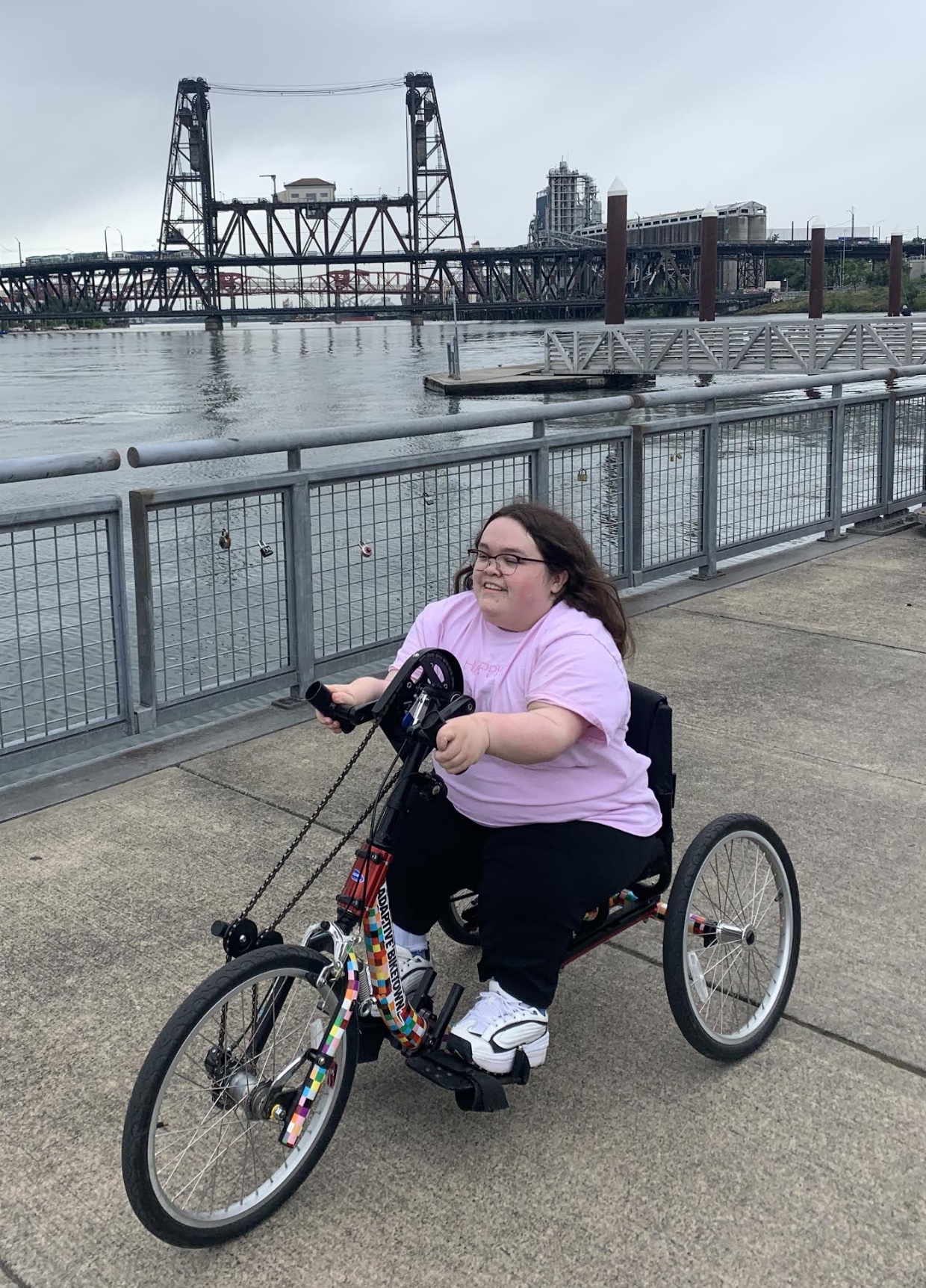
Note: This post is part of a paid promotional partnership between BikePortland and BIKETOWN, operated by Lyft.
Cassie Wilson is a bright spot in Portland’s vast transportation advocacy scene. She’s part of a new guard of activists with an energy for making change that can only be rivaled by her anxiety of making none. Much of Wilson’s fire comes from her youth and the widespread sense among many in her demographic that us older folks have totally dropped the ball when it comes to leaving her generation a habitable planet.
I’ve followed Wilson’s work for a while now (you might recall her guest opinion we published in June 2021), and was thrilled when she recently rode an adaptive bike for the first time. It meant not only does another person get to experience the joy of cycling, it was also proof-positive that our city has created a public bike-share system that is truly breaking down barriers.
The existence of Adaptive BIKETOWN has allowed Wilson to be able to propel herself long distances under her own power for the very first time. Read more about her and this huge step in her personal mobility in the Q & A below:
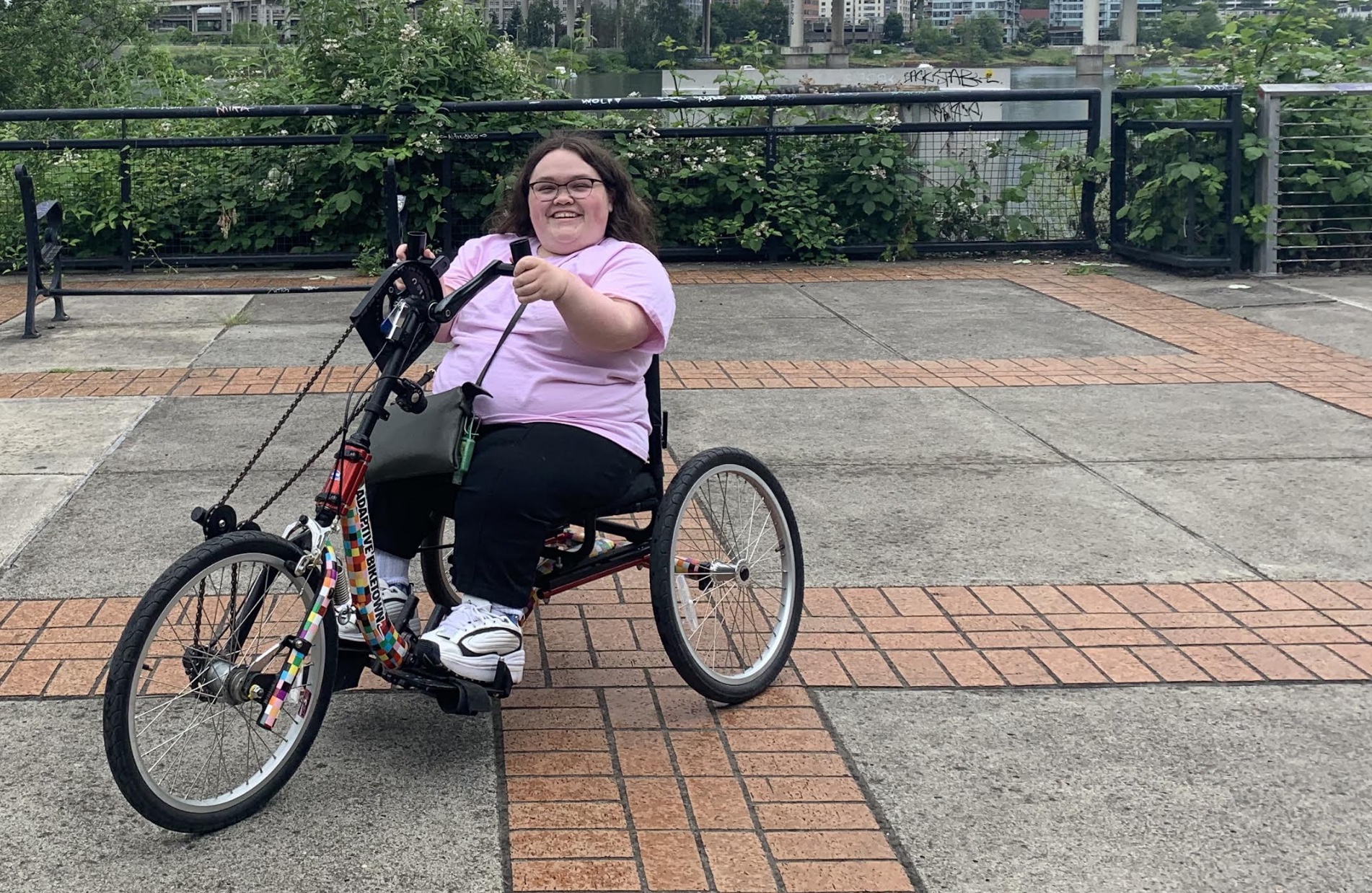
“Adaptive BIKETOWN allowed me to visualize myself and other disabled people having the choice to get around by bike in the future.”
BikePortland: Can you share a bit of personal background?
I’m 24 years old and have lived in Boring, OR [a small, rural town about 15 miles southeast of downtown Portland] for most of my life. I spend a majority of my time advocating for climate, transportation, and disability justice through my work at The Street Trust and outside of that through the Sunrise Movement and in serving on several advisory boards in the region. When I’m not busy doing those things you can find me crocheting, listening to audiobooks, or enjoying the beauty of Oregon that we’re fighting so hard to protect from the impacts of climate change.
How do you describe your disability?
I have a form of dwarfism, so I’m only 3-feet, 7-inches tall. I can’t stand or walk for long periods of time so I use a mobility scooter most places I go.
How does that impact your ability to move around the city?
Wherever I go, I have to think about accessibility. As someone new to riding transit and using my mobility scooter as a form of transportation, I’ve had to think about accessibility in new ways. There are still sidewalks without curb cuts which leads me to have to backtrack and find another route to my destination. There are sidewalks that do have curb cuts, but they point into the middle of the intersection forcing me to go right next to moving traffic to get into the crosswalk. Some bus stops are in areas without sidewalks or where you have to cross through flower beds to get to the bus ramp which is difficult to safely and reliably board when it’s on an uneven surface. Additionally, there’s really only space for two wheelchair users on each bus, so if it’s full I either have to wait for the next one or find another route. With my scooter being battery powered, I try to get most of the way via transit to avoid worrying about needing to find an outlet to charge it.
“I ended up riding 5 miles which I realized was the furthest I’ve ever manually moved my body in my life”
What type of vehicles have you used to get around?
Living in Boring I have no access to public or active transportation infrastructure, so I eventually realized I’d have to drive if I wanted to work, go to school, or really do anything. Even though I am able to drive, cars are still super inaccessible to me. I had to get a wheelchair lift installed in our van and I have to get in with a stool that has a handle allowing me to pull it up into the car and store it in the passenger seat. Now that I am able to go places independently, it actually makes me less reliant on driving because I can drive to Gresham and then travel to Portland via bus or MAX instead of driving all the way there.
When did you first discover an adaptive bicycle?
I’d been aware of adaptive cycles for a while, but didn’t realize how easily accessible they were to disabled people in the Portland area until I connected with Roshin Kurian from PBOT who oversees Adaptive BIKETOWN’s operations. She encouraged me to come down and check out the adaptive bikes they have available to rent, and I ended up finding a small handcycle that worked for me.
What did it feel like to ride one? And how was it different from other vehicles/mobility devices you’d used in the past?
It was super fun to ride a bike for the first time in my adult life! The first time I went to Adaptive BIKETOWN and rode the handcycle I actually ended up riding 5 miles which I realized was the furthest I’ve ever manually moved my body in my life. I used to use a manual wheelchair before I could take my mobility scooter places, but it was a lot easier to propel the handcycle for much farther with less effort. I still don’t have the strength to get up most inclines, so bringing a friend along to give me a boost when needed makes a big difference.
What role did Adaptive Biketown play in the evolution of your mobility?
Adaptive BIKETOWN allowed me to visualize myself and other disabled people having the choice to get around by bike in the future. As a disabled person, it takes a lot of time and energy to find accessible alternatives to most things in life and that includes traditional bikes. Adaptive BIKETOWN lowers the barrier to entry because the variety of cycles they have available to rent all in one place makes it easier to find one to meet your needs.
What do you want people to know about Adaptive Biketown?
One of my favorite things about Adaptive BIKETOWN is its location. The shop is right on the Eastbank Esplanade and close to the Springwater Trail which makes it a nice car-free area to get comfortable on a bike for the first time.
They currently have free one hour rentals and discounted rates beyond that for those who qualify, so this summer is a great time to go check it out!
Anything else you’d like to share with us?
I think we still have a long way to go in terms of infrastructure and investments in these types of programs to make cycling safe, accessible, and convenient across the region. There could definitely be further innovation in the world of adaptive bikes to meet people’s wants and needs. The handcycle is a fun time, but my dream bike to truly get me places would probably be some sort of foot-power e-trike that fits my dwarf proportions and doesn’t exist yet!




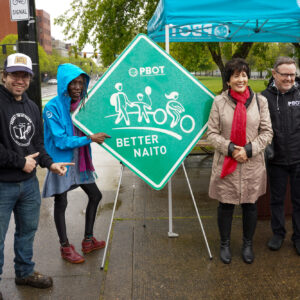
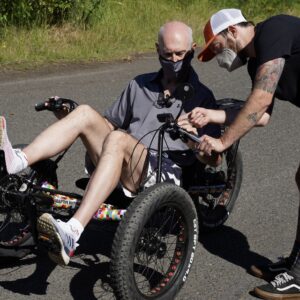
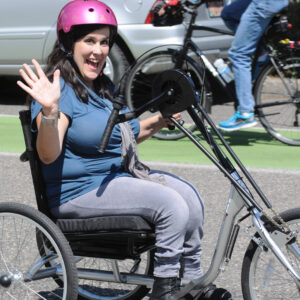

Thanks for reading.
BikePortland has served this community with independent community journalism since 2005. We rely on subscriptions from readers like you to survive. Your financial support is vital in keeping this valuable resource alive and well.
Please subscribe today to strengthen and expand our work.
Thank you Cassie, Jonathan and Adaptive BIKETOWN. Cassie, I appreciated your sharing the nitty-gritty details of maneuvering through an imperfectly accessible environment. It’s hard for even the most empathetic able-bodied person to understand the amount of planning that goes into moving from A to B for someone working with a disability.
Great interview, and looks like fun!
This is sucha great story, thank you for highlighting this uniques and valuable perspective!
We are so lucky to have Cassie in our community. She’s a great advocate for disability and environmental justice, and is just a delight to know. Thanks so much for sharing this conversation!
Great to read about Cassie and how advocacy to get adaptive BikeTown (search BP for past posts) is making a difference!